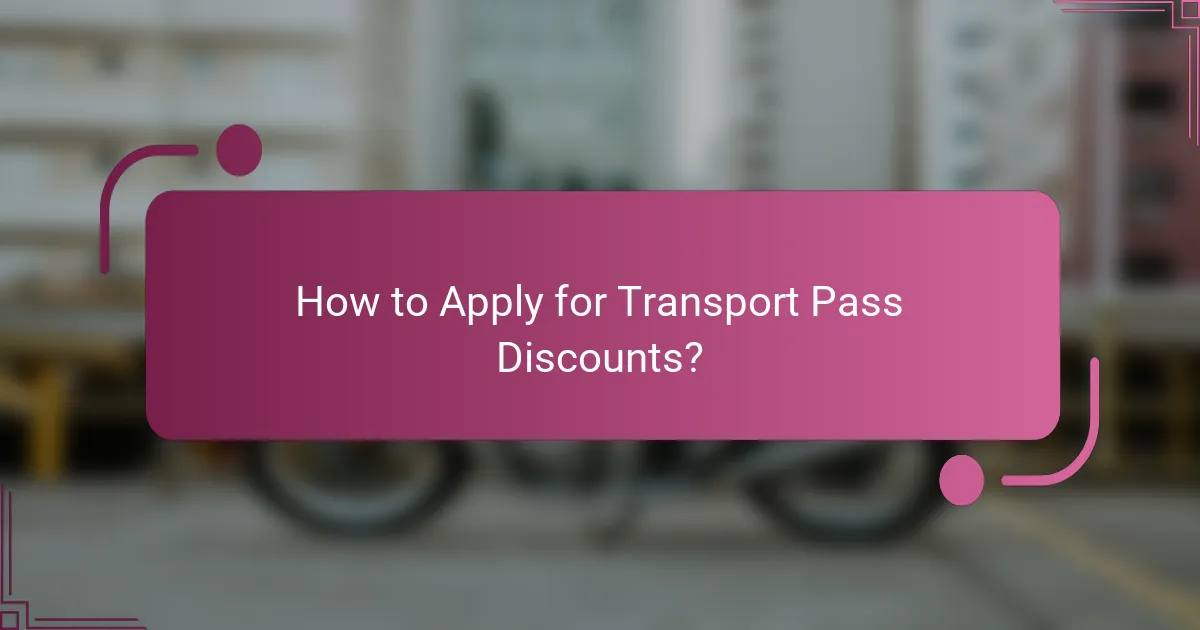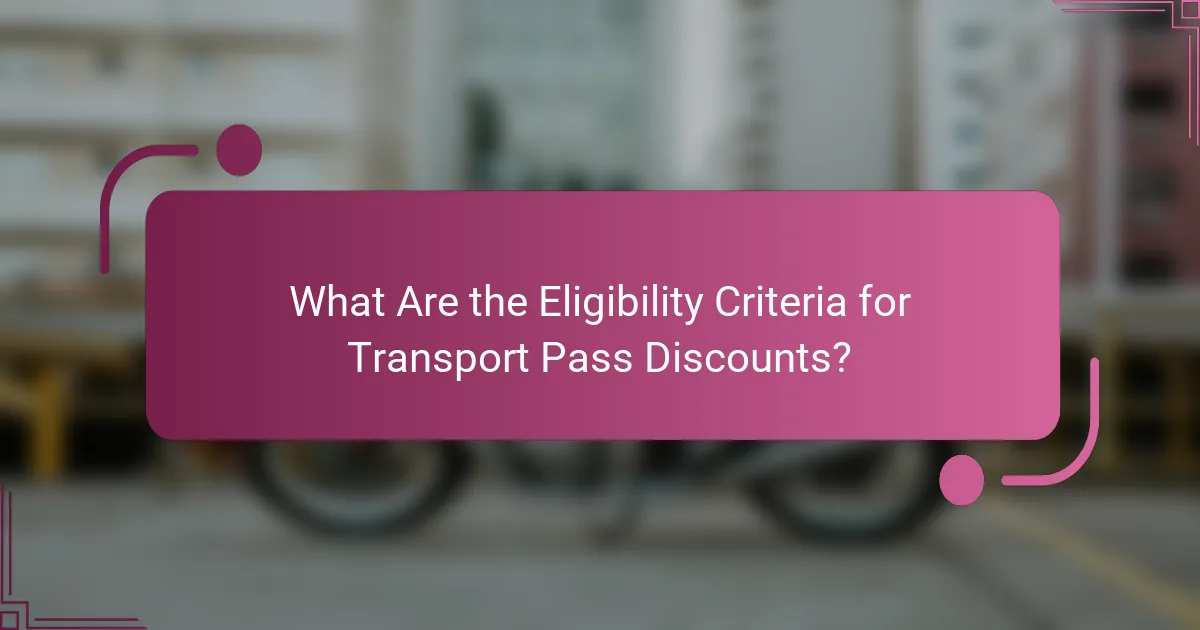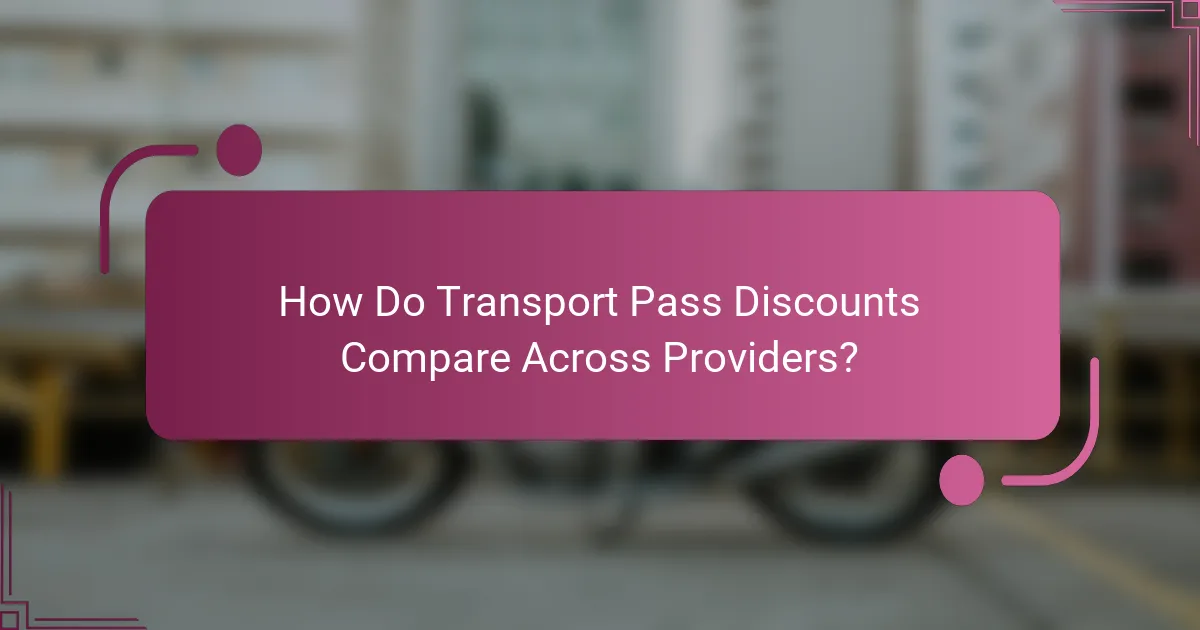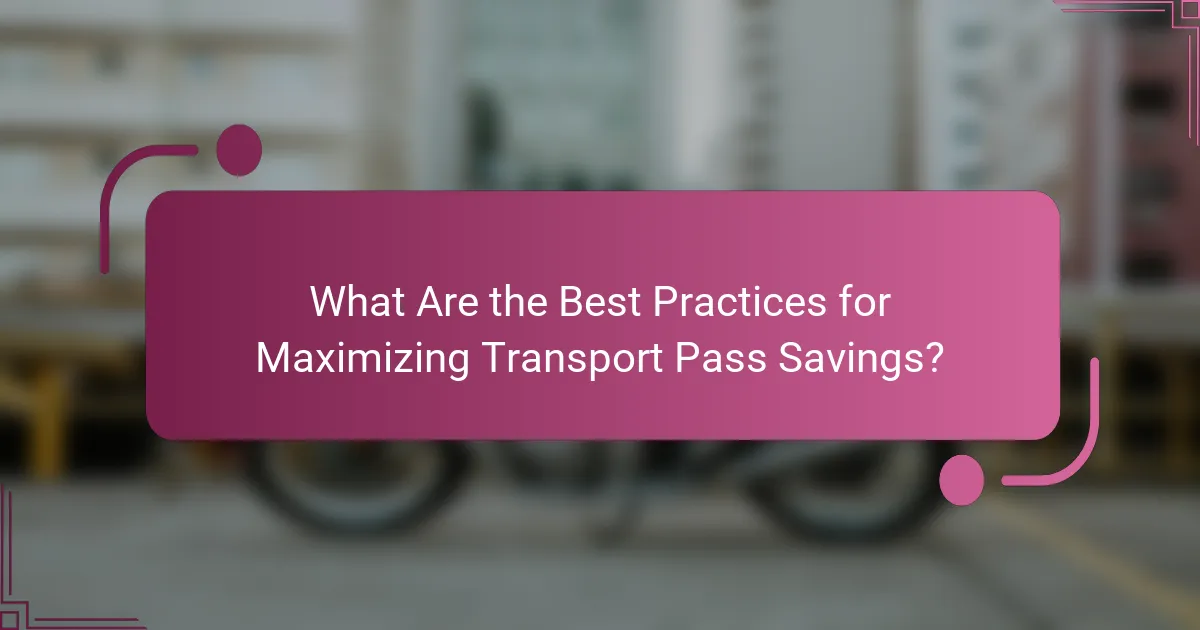Transport passes in [Location] provide various discounts designed to make travel more affordable for students, seniors, and groups. These offers can lead to significant savings, especially during promotional periods or when booking online. To take advantage of these discounts, individuals should familiarize themselves with the eligibility criteria and the application process, which may involve submitting specific documentation either online or in person.
![What Discounts Are Available for Transport Passes in [Location]?](/wp-content/uploads/what-discounts-are-available-for-transport-passes-in-location-1.webp)
What Discounts Are Available for Transport Passes in [Location]?
Transport passes in [Location] often come with various discounts aimed at making travel more affordable for specific groups. These discounts can significantly reduce costs for students, seniors, groups, and those booking online, especially during promotional periods.
Student discounts
Many transport providers offer student discounts on passes, typically ranging from 10% to 50% off standard prices. To qualify, students usually need to present a valid student ID or enrollment verification.
It’s advisable to check with local transport authorities or providers for specific eligibility criteria and the exact percentage of the discount, as these can vary widely by region.
Senior citizen discounts
Senior citizens often enjoy discounts on transport passes, which can be around 20% to 30% off regular fares. Eligibility typically begins at age 60 or 65, depending on the transport service.
To access these discounts, seniors may need to show proof of age, such as a government-issued ID. It’s beneficial to inquire about any additional benefits, like free travel on certain days.
Group travel discounts
Group travel discounts are available for larger parties, often starting at groups of 10 or more. Discounts can range from 15% to 30%, making it more economical for families or friends traveling together.
Booking in advance is usually required to secure these discounts, and it’s wise to confirm the exact number of passengers needed to qualify for the reduced rate.
Seasonal promotions
Seasonal promotions can provide significant savings on transport passes, especially during holidays or peak travel seasons. Discounts during these times may reach up to 50% off for limited periods.
Keep an eye on announcements from transport companies for special deals, and consider subscribing to their newsletters for timely updates on these promotions.
Online booking discounts
Booking transport passes online often comes with exclusive discounts, typically ranging from 5% to 15% off. This incentive encourages travelers to use digital platforms for purchasing tickets.
When booking online, ensure you check for any promo codes or special offers that may apply at checkout to maximize your savings.

How to Apply for Transport Pass Discounts?
To apply for transport pass discounts, you typically need to follow either an online or in-person application process. Each method has specific requirements and documentation that you must prepare to successfully obtain your discount.
Online application process
The online application process for transport pass discounts is often straightforward and convenient. Most transport authorities provide a dedicated portal where you can fill out the necessary forms and submit your application electronically.
To start, visit the official website of your local transport authority, create an account if required, and follow the prompts to complete your application. Be sure to check for any specific eligibility criteria that may apply to your situation.
In-person application requirements
Applying for transport pass discounts in person usually involves visiting a designated office or service center. You may need to bring identification and proof of eligibility, such as student status or age verification.
It’s advisable to check the operating hours of the office and whether you need to schedule an appointment beforehand. Some locations may have specific days dedicated to processing discount applications, so planning ahead can save you time.
Documentation needed
When applying for transport pass discounts, you will typically need to provide several key documents. Commonly required items include a valid ID, proof of residence, and any documentation that supports your eligibility for the discount.
- Government-issued identification (e.g., passport, driver’s license)
- Proof of income or student status if applicable
- Recent utility bill or lease agreement for residency verification
Ensure that all documents are current and legible to avoid delays in processing your application. Double-check the specific requirements of your local transport authority, as they may vary.

What Are the Eligibility Criteria for Transport Pass Discounts?
Transport pass discounts are typically available to specific groups based on age, residency status, and income levels. Understanding these criteria can help individuals determine their eligibility for reduced fares or special offers.
Age requirements
Many transport authorities offer discounts based on age, particularly for children, students, and seniors. For instance, children under a certain age, often around 12, may travel for free or at a significantly reduced rate. Seniors, usually defined as individuals aged 65 and older, often qualify for discounts ranging from 20% to 50% off standard fares.
It’s essential to check local regulations, as age thresholds can vary by region. Some areas may require proof of age, such as an ID or a birth certificate, to access these discounts.
Residency status
Residency status can affect eligibility for transport pass discounts, especially in cities or countries that offer local resident rates. Typically, residents may benefit from lower fares compared to non-residents or tourists. Proof of residency, such as a utility bill or government-issued ID, is often required to qualify for these discounts.
In some cases, students studying in a different region may also be eligible for local discounts, provided they can show valid student identification and proof of enrollment.
Income thresholds
Income thresholds are another common criterion for transport pass discounts, particularly for low-income individuals or families. Many transport systems offer reduced fares for those who can demonstrate financial need, often requiring documentation such as tax returns or pay stubs.
Discounts based on income can vary widely, with some programs offering up to 50% off standard fares. It’s advisable to inquire about specific income limits and required documentation at local transport offices or websites.

How Do Transport Pass Discounts Compare Across Providers?
Transport pass discounts vary significantly among providers, impacting overall travel costs. City transit authorities often offer lower fares compared to regional services and private companies, but the benefits and coverage can differ widely.
City transit authority vs. regional services
City transit authorities typically provide discounted passes for local travel, which can include monthly or annual options. These passes often cater to daily commuters, offering savings of around 20-30% compared to single fares.
In contrast, regional services may offer passes that cover broader areas, including suburban routes. While these passes can be more expensive, they often provide greater flexibility and access to multiple transport modes, such as buses and trains.
Private transport companies
Private transport companies frequently offer their own discount passes, which can vary widely in terms of pricing and benefits. These passes might include options for ride-sharing or shuttle services, often appealing to specific user groups like students or frequent travelers.
Discounts from private companies can range from 10-25% off regular fares, but users should carefully evaluate the terms, as some passes may have restrictions on usage times or routes.
Comparison of benefits
When comparing benefits, city transit authorities usually excel in affordability and coverage for urban travel, while regional services provide broader access and convenience for longer journeys. Private companies may offer unique perks, such as loyalty programs or additional services.
To choose the best option, consider factors like travel frequency, distance, and specific routes. It’s advisable to calculate potential savings based on your travel habits and to review any additional benefits that may enhance your commuting experience.

What Are the Best Practices for Maximizing Transport Pass Savings?
To maximize savings on transport passes, consider combining discounts, utilizing loyalty programs, and timing your purchases strategically. Each of these practices can lead to significant reductions in travel costs, making your transportation budget stretch further.
Combining discounts
Many transport providers offer various discounts that can be combined for greater savings. For instance, you might find student, senior, or group discounts available alongside seasonal promotions. Always check the terms of each discount to ensure they can be stacked.
When purchasing a transport pass, look for bundled offers that include additional services, such as free rides on certain days or discounts at partner businesses. This can enhance the value of your pass and provide extra savings.
Using loyalty programs
Loyalty programs can significantly reduce transport costs over time. Many transport companies reward frequent travelers with points that can be redeemed for free rides or discounts on future purchases. Signing up for these programs is often free and can lead to substantial savings.
Be sure to track your points and understand the redemption process. Some programs may have expiration dates or specific conditions for using points, so staying informed can help you maximize your benefits.
Timing your purchases
Timing can play a crucial role in maximizing savings on transport passes. Purchasing passes during promotional periods, such as holidays or special events, can yield significant discounts. Additionally, some providers offer lower prices for advance purchases compared to last-minute buys.
Consider the travel season as well; off-peak times often come with reduced fares. Monitoring price trends and being flexible with your travel dates can help you take advantage of the best deals available.
